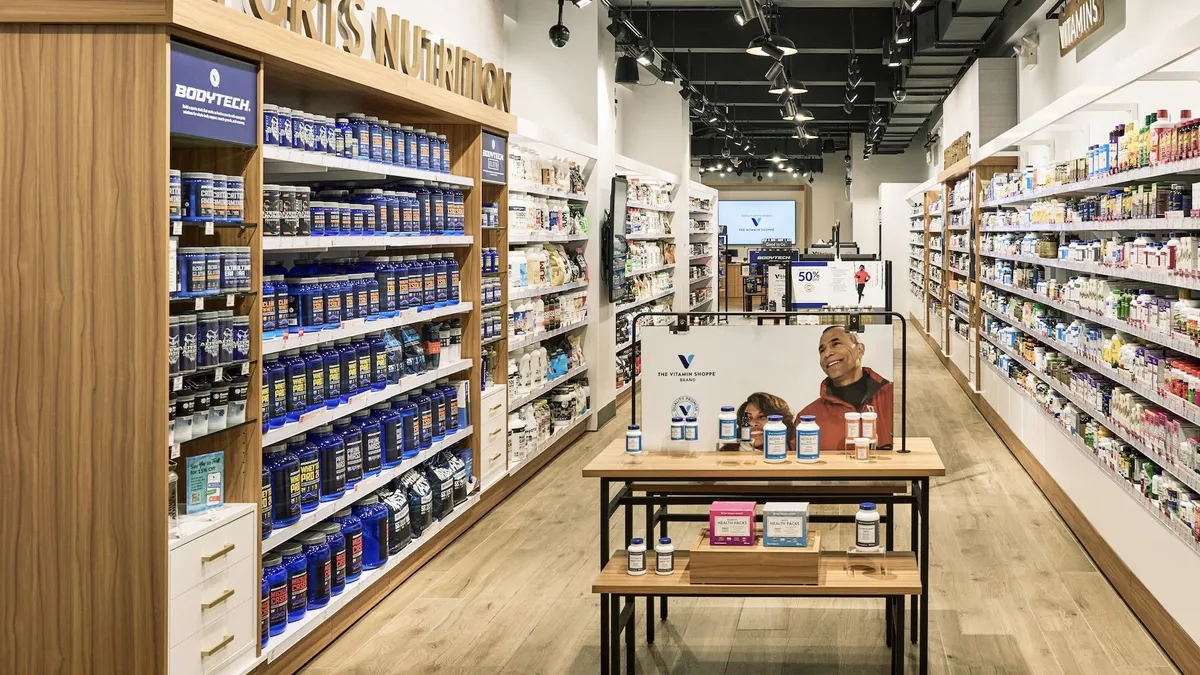The following article is part of the "30 minutes" series, where Retail Dive talks to top executives about some of retail's hottest topics. You can find more interviews here.
Mike EdwardsStrategic advisor for e-commerce and retail technologies at iterate.ai, and former CEO of eBags, Borders and Lucy Activewear.
Experience
For the last 35 years, Edwards has held CEO or executive positions at big-box retailers and small pure players alike. In 2007, Edwards sold Lucy Activewear to VF Corporation for $110 million. In 2011, after a failed turnaround he liquidated Borders, and in 2017 he sold eBags to Samsonite for $105 million. Today, he serves on Drexel University's board of trustees, teaches several classes and recently joined iterate.ai as a strategic advisor on a part-time basis as he considers CEO positions at retailers, CPG companies and online pure plays.
Mike Edwards can pinpoint the moment when he suddenly realized the retail industry had transformed beneath his feet. It was 2011, and after two years of iterating on a turnaround that was floundering without much-needed capital, he reluctantly liquidated the second-largest bookstore chain in the country: Borders.
"Music in short order became 50% digitally consumed, that was the second floor of Borders. Then video became 60% consumed digitally, and then books became 30% consumed digitally — so then your only choices are to retreat," he told Retail Dive in an interview. "To shrink, right size, protect your balance sheet and then slowly migrate into some differentiated businesses or services or categories that can extend your foothold longer term. It's sort of a painful transformation that many companies have to make."
And like Borders, not all make it out alive. In fact, if you ask Edwards, the clock is ticking down for legacy and big-box players, unless drastic measures are taken to shed the traditional business model. "Unfortunately, I think we're at the tipping point where the legacy dinosaur retailers [will] become very obsolete from a leadership perspective," he said.
"People say 'Well, Mike you're a retail expert.' And I say, no actually I'm a retail student because everything I've learned in the last 35 years is helpful. It's not really the answer to the future."

Edwards' criticism comes from personal experience. Throughout his career he has been the CEO of Lucy Activewear, Borders and most recently pure-play luggage e-tailer eBags, a role he stepped down from in September after selling the business to Samsonite. After walking away from Borders, he came to the realization that he needed to rethink his business philosophy and learn how to adopt a digital-first mindset, something he believes all executives need today to combat Amazon.
"You know, I grew up where the merchant ruled the roost. And I was one of the merchants, so I loved that, but at the same token that's not true anymore," he said. "Now you have to be digitally savvy in marketing and as a merchant, and think about the seamless experience of the customer — it's a completely different process."
For the last several years Edwards has devoted his time to learning how to become a digital merchant by experimenting with emerging technology, and seeking advice and honest feedback from forward-thinkers shaking up the industry. He recently joined the retail innovation consultancy iterate.ai as a strategic advisor for e-commerce and retail technologies. Off and on over the last six months, he's also been teaching courses on digital marketing, retailing, corporate strategy and corporate governance at Drexel University.
"People say 'Well, Mike you're a retail expert.' And I say, no actually I'm a retail student because everything I've learned in the last 35 years is, well, helpful. It's not really the answer to the future."
Relearning retail leadership for a new era
As Edwards sees it, retail is going back to its roots of small, community- and urban-driven stores. And for retail executives to succeed in this new landscape, they need to use data and emerging technology to guide business decisions.
To get there, retailers will have to make a massive cultural and philosophical shift. And that starts at the executive level.
"In my age of retailing, it was all about the product and then finding the right locations and making sure the customer can find this product because that's why we're here. Today, it's I can find product anywhere. So unless you have this really differentiated product, you better win on a couple other continuums as well," Edwards said.
"If you're asking me as a CEO or a senior executive to invest in a somewhat uncomfortable technology with not a clear proven ROI, I'm hesitant. Versus a tech company says if I don't do it, I don't survive. I think it's truly cultural."

Today, retailers should decide on their ideal customer journey and then work out the economics of it, he advises. And a huge part of making the hurdle over the legacy perspective is by surrounding yourself with mentors and colleagues that challenge traditional business strategies. For Edwards, that turning point happened through conversations with Faisal Masud, who was Staples' executive vice president of global e-commerce during the time Edwards was executive vice president of global merchandising there. (Masud was later tapped as the company's first chief technology officer in 2016, but stepped down from that role at the end of 2017.)
"He taught me digital," he said. "I didn't want to hear it. When he first walked in, I'm like 'who is this punk kid?' He cared less about meetings and bureaucracy and that stuff. And he was right. He was about moving fast and breaking the rules and transforming businesses."
As the old guard falls from fashion, it's more important than ever for executives, no matter their age, to find a foundation for education and keep an ear to the ground when it comes to emerging technology. Executives should take a page from the startup playbook and ditch the old school mindset that EBITDA and EPS are the most critical metrics to track.
"If you're asking me as a CEO or a senior executive to invest in a somewhat uncomfortable technology with not a clear proven ROI, I'm hesitant," Edwards said. "Versus a tech company [which] says, if I don't do it, I don't survive. I think it's truly cultural."
In this new era of retailing, Edwards said he sees more creative, digital-first players as those with the advantage. And flipping the mindset will require companies to embrace younger employees.
"I do think there has to be a pretty massive executive change and cultural shift. They're just not capable of doing it on their own because they're so well-established, they have bureaucracies and power structures," he said. "I think in the new world, at least from the millennial view they don't care about that stuff, they just want to be a part of something great and contribute."
The tech industry, including the rise of e-commerce and retail tech startups, has completely shaken up expectations. But retail executives would do well to lose their balance a little in hopes of landing on a riskier culture that promotes experimentation with technology and services that could shape the new retail landscape.
"That startup dynamic which probably Google still has, Apple still has and oddly, Amazon still has, is still kind of — hey give me a team of eight crazies and go change the world," Edwards said.
Using tech to lead the way
Unlike his days at big-box retailers like Borders and Staples, Edwards has a fresh perspective on decision making and success metrics — and it's rooted in business intelligence.
"Coming out of a 100% pure play, data was my engine," he said. "We would literally AB test maybe 20 different UX changes or technology enhancements. And if I were just going to take a thousand bucks and bet it on myself, I'd have $500 because I was right half the time."
Retailers are collecting more data than ever on consumers in the hope that personalized experiences will woo them into their virtual or physical stores. Amazon is known to do this with an overwhelming amount of success that has helped it grow a wide-reaching Prime ecosystem. Others should take note and consider the long-term benefits.
"I think the problem is that most people have unstructured data and they don't really know how to turn it into business intelligence and then use AI to make it somewhat predictive... And I still think that's a massively big weak point."

According to Edwards, data should drive 70% of business decisions, while the rest is left to personal judgment and wild bets. Artificial intelligence is perhaps the most critical technology for retail executives today, Edwards said, and one that retailers have to own, both for the customer experience and for business use. But as he looks around, he sees more executives than not in a reactive stage that shows they're "way late to the game."
"I think the problem is that most people have unstructured data and they don't really know how to turn it into business intelligence and then use AI to make it somewhat predictive, so you can start to get some real insights about strategically where you need to start moving your categories and your brand and your marketing," Edwards said. "And I still think that's a massively big weak point."
Being able to effectively utilize the vast streams of data collected is a game changer when it comes to turning around a struggling business.
"My process of taking over a company is somewhat identical to what I did starting with Lucy. I [would] always go through a pretty rigorous strategic planning process [asking]: who is our customer? What are our priorities. Do we have the right capital? Do we have the right talent and structure? What are we hoping that our financials will look like a year or two out?" he explained.
"When I asked my team who our customer was, they very accurately described the Nike customer. But what the data said is that our customer is 40 years old, she doesn't crack a sweat, she likes activewear, she likes the fabrications, she likes the fit. As a result, the industry exploded, partially us in the U.S. and Lululemon in Canada," he said.
Technology like AI is also dramatically changing the customer experience and the paths to purchase. It wasn't too long ago that Amazon announced the launch of a smart assistant — one that is now housed in roughly 31 million Echo devices in homes across the U.S. Meanwhile, Google is quickly gaining with about 14 million Google Home devices sold to date, according to recent estimates from Consumer Intelligence Research Partners.
"I thought, what if I was running Macy's and Black Friday comes along, and what if my best customers were sitting at home talking to Alexa?" Edwards said. "How do I make that work for me?"
Whether or not retailers are ready, voice commerce is here, and sharp executives need to find a way to use it — and other emerging technologies — to boost their brand and build loyalty with their core customer.
"When you're slayed by digital forces and you have Amazon on one end and you have Netflix taking your movie business and Apple taking your music business, you're saying to yourself — wow this is my whole world — I'm in retail. Checkmate.'"

While Edwards isn't a retail CEO at the moment, he hasn't given up on leading brands into this new world of retailing. But becoming a self-described digital merchant has changed his outlook on what type of company has the best shot at making it.
Between consulting and teaching, Edwards is considering several CEO positions at retailers, CPG companies and online pure plays. It takes a special set of skills to run each and every one of these businesses — but as Edwards has waded through rough times in retail, he's become more confident than ever that technology is the way forward.
"When you're slayed by digital forces and you have Amazon on one end and you have Netflix taking your movie business, and Apple taking your music business, you're saying to yourself — wow this is my whole world," Edwards said. "I'm in retail. Checkmate.'"























